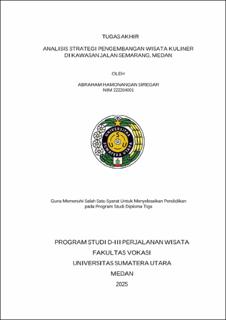| dc.description.abstract | Jalan Semarang area in Medan City is one of the prominent night culinary tourism centers, characterized by diverse flavors, strong Chinese cultural influences, and a vibrant social atmosphere. Despite its significant potential, this area has not been optimally developed due to several challenges such as limited public facilities, unstructured vendor management, inadequate digital promotion, and insufficient integrated local government involvement. This study aims to explore the current conditions of Jalan Semarang, identify obstacles in its development, and formulate appropriate strategies to transform it into an organized, attractive, sustainable culinary tourism destination that benefits the local community socioeconomically. This research employs a qualitative descriptive approach with a case study method. Data were collected through field observations, in-depth interviews with culinary business actors, visitors, local residents, and officials, supported by visual documentation. Data analysis was conducted narratively to depict the real situation on-site and support the formulation of practical development strategies. The findings reveal that Jalan Semarang has great potential in culinary uniqueness, historical value, and visitor enthusiasm. Nevertheless, challenges such as limited parking, restrooms, seating, unorganized vendor management, minimal usage of digital media for promotion, and limited comprehensive government involvement persist.
Keywords: Culinary tourism, jalan semarang, development strategy, night tourism, Medan city | en_US |


